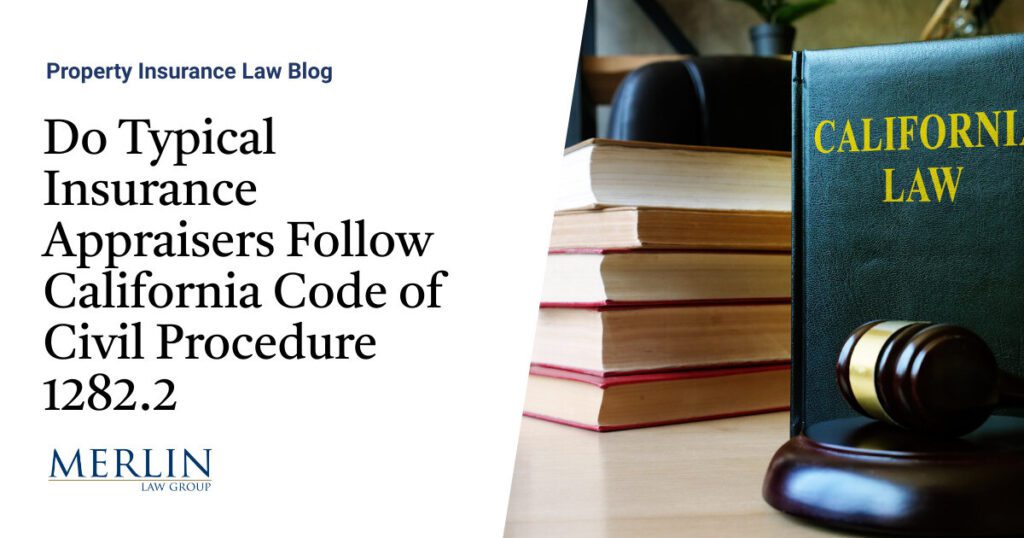Do Typical Insurance Appraisers Follow California Code of Civil Procedure 1282.2?

The IAUA seminar in Marina Del Rey had two excellent instructors discuss the legal aspects of California insurance appraisals last week. The special presentation on California issues involving appraisal, presented by insurance defense attorney Larry Arnold and policyholder attorney Joel Gumbiner, noted that California Code of Civil Procedure 1282.2 had to be followed by the insurance panel. The problem is that the majority of those in attendance were conducting their appraisals in the more traditional manner and not following California law.
California Code of Civil Procedure 1282.2 requires the appraisal panel to do the following:
Unless the arbitration agreement otherwise provides, or unless the parties to the arbitration otherwise provide by an agreement which is not contrary to the arbitration agreement as made or as modified by all the parties thereto:
(a)(1) The neutral arbitrator shall appoint a time and place for the hearing and cause notice thereof to be served personally or by registered or certified mail on the parties to the arbitration and on the other arbitrators not less than seven days before the hearing. Appearance at the hearing waives the right to notice.
(2) With the exception of matters arising out of collective-bargaining agreements, those described in Section 1283.05, actions involving personal injury or death, or as provided in the parties’ agreement to arbitrate, in the event the aggregate amount in controversy exceeds fifty thousand dollars ($50,000) and the arbitrator is informed thereof by any party in writing by personal service, registered or certified mail, prior to designating a time and place of hearing pursuant to paragraph (1), the neutral arbitrator by the means prescribed in paragraph (1) shall appoint a time and place for hearing not less than 60 days before the hearing, and the following provisions shall apply:
(A) Either party shall within 15 days of receipt of the notice of hearing have the right to demand in writing, served personally or by registered or certified mail, that the other party provide a list of witnesses it intends to call designating which witnesses will be called as expert witnesses and a list of documents it intends to introduce at the hearing provided that the demanding party provides such lists at the time of its demand. A copy of such demand and the demanding party’s lists shall be served on the arbitrator.
(B) Such lists shall be served personally or by registered or certified mail on the requesting party 15 days thereafter. Copies thereof shall be served on the arbitrator.
(C) Listed documents shall be made available for inspection and copying at reasonable times prior to the hearing.
(D) Time limits provided herein may be waived by mutual agreement of the parties if approved by the arbitrator.
(E) The failure to list a witness or a document shall not bar the testimony of an unlisted witness or the introduction of an undesignated document at the hearing, provided that good cause for omission from the requirements of subparagraph (A) is shown, as determined by the arbitrator.
(F) The authority of the arbitrator to administer and enforce this paragraph shall be as provided in subdivisions (b) to (e), inclusive, of Section 1283.05.
(b) The neutral arbitrator may adjourn the hearing from time to time as necessary. On request of a party to the arbitration for good cause, or upon his own determination, the neutral arbitrator may postpone the hearing to a time not later than the date fixed by the agreement for making the award, or to a later date if the parties to the arbitration consent thereto.
(c) The neutral arbitrator shall preside at the hearing, shall rule on the admission and exclusion of evidence and on questions of hearing procedure and shall exercise all powers relating to the conduct of the hearing.
(d) The parties to the arbitration are entitled to be heard, to present evidence and to cross-examine witnesses appearing at the hearing, but rules of evidence and rules of judicial procedure need not be observed. On request of any party to the arbitration, the testimony of witnesses shall be given under oath.
(e) If a court has ordered a person to arbitrate a controversy, the arbitrators may hear and determine the controversy upon the evidence produced notwithstanding the failure of a party ordered to arbitrate, who has been duly notified, to appear.
(f) If an arbitrator, who has been duly notified, for any reason fails to participate in the arbitration, the arbitration shall continue but only the remaining neutral arbitrator or neutral arbitrators may make the award.
(g) If a neutral arbitrator intends to base an award upon information not obtained at the hearing, he shall disclose the information to all parties to the arbitration and give the parties an opportunity to meet it.
I know that many readers will say that this is an arbitration code. The lesson is that California law requires appraisers to follow this procedure.
I am certain that Joel and Larry, as well as most attorneys, follow this method. However, in my informal survey, my impression is that the vast majority of California appraisals are not conducted using this method when attorneys are not involved. Instead, they resort to the informal methods that most appraisers use in most states.
As a lawyer licensed in California, I want to alert California appraisers that the appraisals you are conducting can be subject to challenge if they do not follow the law. Joel and Larry provided the audience with the law regarding California appraisals, and I think most were genuinely surprised that California calls for this process.
Thought For The Day
Spring is nature’s way of saying, ‘Let’s party!’ and in California, we’re always ready for the party.
—Robin Williams



